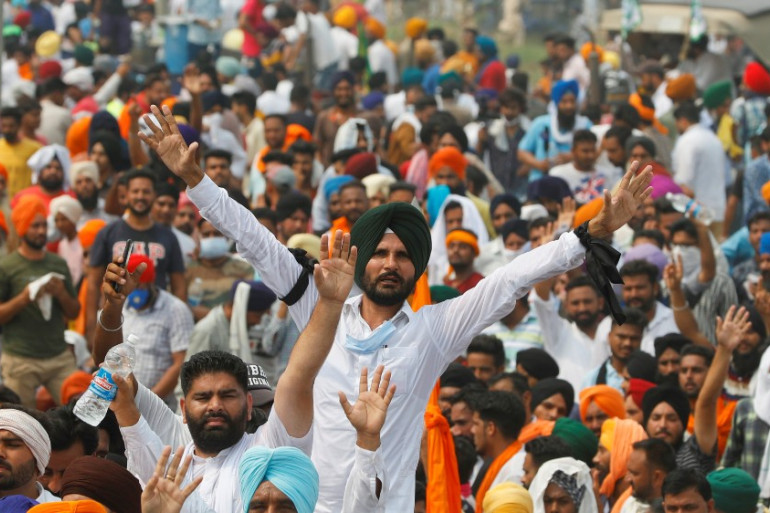Farmers are Struggling, Why is No One Talking About It
Farmers in Punjab blocking the national highway while protesting against the new bills.
February 2, 2021
The people of India have finally reached their breaking point, and they have no one to turn to but themselves.
On September 15, 2020, the Parliament of India passed The Essential Commodities (Amendment) Bill, which results in the farmers of India losing control of agriculture crops, land, and money. The Essential Commodities Bill removes products i.e. grains, potatoes, onions, edible oils, oilseeds, pulses (lentils), and cereals from the list of essential commodities. This bill also allows farmers to be exploited by private contractors who want to buy their crops for much less and sell for much more.
Many farmers have already been affected in different parts of India, with more expected to experience hardship in the coming months.
In response to the farmers’ protest, Mr. Narendra Modi, India’s prime minister, had only this to say, according to Reuters: “All these people who are protesting in support of farmers, what did they do when they were in power?” Referring to the politicians and the many Indian citizens that are opposing him, he went on to say, “I ask even those opposing me today, that my government is ready to talk to them on farmer issues…I urge our farmers to not be misled by anyone.”
Mr. Modi believes that the farmers themselves are misled by other opposition parties of India. He says that he is here to help them, but doesn’t answer any questions regarding the ones already suffering.
According to Quartz India writer Vijayta Lalwani, farmer Pradeep Singh owns two acres of land in the Jhajjar District of Haryana. He had taken a loan out at the beginning of the season but did not make much, causing him to not pay for his five-year-old daughter’s primary school fee.
In an interview with Lalwani, Singh explained, “Suppose if small farmers come together to enter into a contract with one private entity and decide earlier on that they will grow potatoes and sell it for Rs30 (41 cents) a kilo (2.20 pounds). They give us the seeds and fertilizer, and when the time comes for harvest, the corporation will come to buy it at the decided rate even if the market price is Rs50 (68 cents). They will not increase it.”
For example, the normal rate for the purchase of potatoes in the U.S is about 0.78 cents per pound. Imagine a farmer signing up to work with a corporation, but that corporation buys the potatoes from the farmer at a lower fixed rate and sells them at a much higher price to the consumers. That leaves the farmers with no small buyers and the corporation with a monopoly. Furthermore, the corporation’s monopoly leaves farmers with no bargaining power, which forces them to sell their products at lower market values. While farmers are losing money, corporations are booming because all their competition is out of the way.
Lalwani also spoke to Gurpreet Kaur, a 48-year-old farmer who owns 11 acres of land in Ludhiana, Punjab. She farms rice, wheat, and vegetables on her land, and says that she has to take an investment of Rs20,000 ($273.55 US) per acre. In total, she pays around Rs 220,000 ($2,735.56 US) per harvest. The money she makes from selling does not produce a profit high enough to live comfortably.
Not working with corporations is not an advantage either. Money is being spent out of their own pockets and this results in an undesirable level of profit. All the time and effort put into farming and selling, is not worth it, if farmers make an unsatisfactory amount-or worse yet, lose money.
According to the Associated Press, in September many protest leaders-farmers from Punjab, Haryana, and Uttar Pradesh-arrived in New Delhi, on tractors and on foot. They then blocked roads and set up camps for over a month. Some were camping on the roads or in their tractors, many places of worship supplied food for the protestors.
Places outside of New Delhi also have been seen protesting in support of the plight of farmers. In nations with strong Indian populations like the United States, New Zealand, Canada, United Kingdom, and Australia there have been a few car rallies and even protests in the middle of many towns.
As the farmers in India are currently fighting for their rights, we can not help but think about the ones losing everything they own.













































